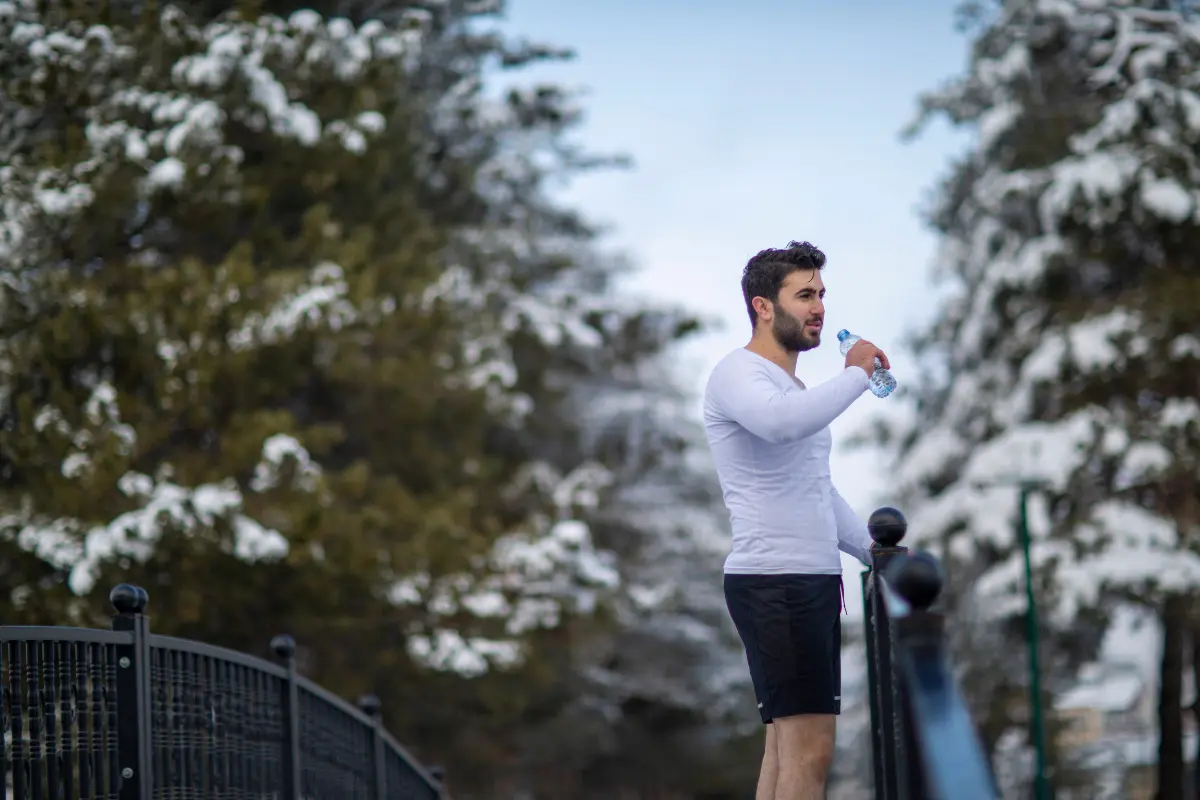
These winter hydration tips will help you perform at your best—even through the chilly season.
The winter months often bring a cozy stillness, but for athletes, that doesn't mean our training grinds to a halt. Whether you're hitting the slopes, pounding the pavement in the brisk air, or keeping up your indoor lifting routine, hydration is just as crucial in winter as it is in the summer.
We often associate dehydration with hot weather, but the cold air can be more deceptive, leading to unnoticed and underestimated fluid loss. Understanding and implementing proper winter hydration tips is paramount for peak performance and overall well-being. Let's dive into how to stay hydrated even when the temperature drops.
The Sneaky Dehydration of Winter
It's easy to overlook hydration in the winter for a few key reasons:
Advertisement
- Reduced Thirst Response: Cold temperatures can suppress your thirst mechanism, making you less aware of your body's need for fluids.
- Increased Respiratory Loss: You might not feel like you're sweating as much, but the cold air is dry. You lose fluids through breathing, and that loss is actually accelerated in cold, dry conditions.
- Layered Clothing and Increased Sweat: While you may not be dripping sweat like in the summer, your layered workout clothes can trap moisture, leading to significant fluid loss during training.
- Indoor Heating: Indoor environments are often heated, further drying out the air and contributing to dehydration.
These factors combine to create a perfect storm for dehydration, potentially impacting your energy levels, endurance, muscle function, and even recovery. So, how do we combat this? Here are some essential staying hydrated in winter strategies:
Practical Winter Hydration Tips for Athletes
- Don't Wait Until You're Thirsty: Relying on your thirst alone in cold weather can be a mistake. Be proactive and drink consistently throughout the day, not just during workouts.
- Hydrate Before, During, and After Exercise: Make a conscious effort to hydrate before you head out for a workout. Sip on water during your session, and be sure to rehydrate thoroughly afterward.
- Warm Beverages Count Too: While water is ideal, warm beverages like herbal teas, broth, or even hot water with lemon can be great ways to increase your fluid intake, especially when you crave something comforting.
- Carry a Water Bottle: Keep a water bottle with you at all times, whether you're at work, training, or just running errands. Having it readily available makes it easier to remember to drink.
- Electrolyte Balance: Consider incorporating electrolyte-rich drinks or foods, especially for longer or more intense workouts. You lose not just water but also important minerals when you sweat.
- Listen to Your Body: Pay attention to any subtle cues of dehydration, like fatigue, headache, dizziness, or muscle cramps. These are your body’s signals to drink up.
- Increase Hydration in the Days Leading Up to Intense Exercise: If you have a big competition or a long run planned, start hydrating even more diligently a couple of days prior to ensure you're fully prepared.
- Incorporate Hydrating Foods: Did you know you can get some hydration through your food? Think about adding fruits and vegetables with high water content, such as oranges, cucumbers, or spinach, into your daily diet.
Specific Considerations for Cold Weather Hydration
Here are a few final tips to help you stay hydrated in the winter.
-
Warm Up Your Water: Drinking ice-cold water may feel refreshing in the summer, but in the winter, it can make you feel colder. Opt for room temperature or slightly warm water.
-
Plan Ahead: Before you head out for your workout, pack extra fluids, especially if you'll be outdoors for an extended period.
Advertisement
-
Consider a Hydration Pack: For long outdoor workouts, a hydration pack with insulated hoses will prevent your water from freezing so you can stay hydrated easily.
-
Don't Over-Hydrate: While dehydration is a concern, over-hydrating can also be problematic. Stick to your fluid needs and listen to your body's cues.
-
Mind Your Alcohol and Caffeine: Remember that alcohol and caffeine can have a diuretic effect, potentially contributing to dehydration. Moderate your consumption of these beverages, and compensate by increasing your water intake.
TLDR: Winter Hydration Tips for Athletes
Don't let the cold weather trick you into thinking you don't need to stay hydrated! By being mindful of the subtle dehydration risks associated with winter and incorporating these cold-weather hydration strategies, you can maintain your peak performance, support your recovery, and stay healthy all season long. Remember, staying hydrated is not just about water intake; it’s about understanding your body's needs and responding appropriately. Keep drinking and keep moving!
Advertisement
What are your favorite winter hydration tips? Share them in the comments below! And be sure to share this blog post with your fellow athletes to help them stay hydrated this winter.
Schedule a Free Intro Call
Working Against Gravity has led the macro tracking and health space for over a decade. Our team doesn’t just understand the science of nutrition—we’ve spent years mastering the art of tailoring it to fit your life. That means no cookie-cutter plans, just real strategies that have worked for over 30,000 people.
Schedule a free call with our team to learn how working with a 1-on-1 WAG coach will help you reach your goals.



